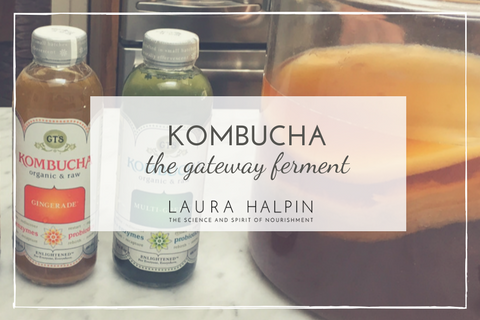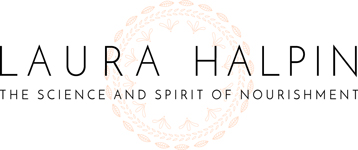
The Scoop on Kombucha
Just in case you were curious about this "latest" beverage trend, I though I'd give you the Kombucha scoop.
Kombucha is a fermented sweetened tea made with a weird and slimy culture called a SCOBY (Symbiotic Culture of Bacteria and Yeast), also known as a "mother" or "mushroom." As a result of the fermentation process, kombucha contains beneficial bacteria, yeasts and acids.
Kombucha tastes like a vinegar-y tea. The longer it ferments, the less sweet and more sour it becomes. Some say it's an acquired taste. Since I love the taste of vinegar, to me kombucha's the bomb.
While sauerkraut and other fermented vegetables are lactic acid ferments, kombucha is an acetic acid ferment, resulting in different bacteria and yeasts and thus different health properties.
There's not a lot of conclusive data on its health benefits, perhaps due to the absence of funding for clinical trials that don't result in pharmaceutical profits. Nevertheless, I'll share with you what I know from my studies and anecdotal information from my family and clients.
Kombucha 101
Kombucha has gone mainstream in the past few years, but it has a long history as a health elixir.
The earliest recorded use of kombucha, then called "Sea Treasure," "Stomach Treasure," and "Sea Mushroom," dates back to China's Qin Dynasty 220 BC. Across the sea, the samurai of Japan reportedly carried it in wine skins to drink for energy during battle.
It made its way along the Silk Road into Russia and Europe where it remained popular right up until the time sugar and tea were rationed during World War 2. Kombucha drinking has experienced a resurgence since the early 2000s, and is now widely available in mainstream grocery stores. Have you seen it in yours?
What are the benefits?
The SCOBY is the engine behind kombucha brewing. As the bacteria and yeasts in the SCOBY munch away and break down the sugar in the tea, they produce different acids, bacteria and yeasts that are beneficial for our health.
Kombucha contains acetic acid (also contained in vinegar) which has anti-microbial and anti-bacterial properties against strains such as e.coli and salmonella. It also helps stabilize blood sugar, helps prevent constipation, increases the body's absorption of minerals from food. (These benefits also result from drinking apple cider vinegar.) Kombucha also contains gluconic acid which helps the liver detoxify.
Although the bacteria and yeast vary from batch to batch, kombucha contains probiotics and yeasts such as Acetobacter, Saccharomyces, Brettanomyces, Lactobacillus, Pediococcus, Gluconacetobacter, and Zygosaccharomyces.
Kombucha also contains compounds that are anti-spasmodic, anti-arthritic and pain-relieving. Just the tea itself has antioxidants and polyphenols that are health protective.
Although kombucha doesn't cure anything, consuming it does seem to have a positive effect. Some kombucha drinkers just drink it because they enjoy the taste, yet many notice a positive effect on digestion (it seems to help especially with constipation). Others drink it for energy, as an immune support and for relief from joint pain. I have one client who experiences a noticeable reduction in anxiety from regularly drinking kombucha.
Just be aware...
Kombucha contains
- sugar
- small amounts of alcohol
- caffeine
That said, please don't over-consume.
When one first starts drinking kombucha, it is possible to feel worse at first.
Why?
Kombucha contains beneficial bacteria and yeasts, which can cause a die-off off pathogenic yeasts and bacteria in the gut. This is a positive thing, but this die-off can cause what is known as a "healing crisis" where symptoms temporarily worsen. This reaction can happen with the addition of any ferments or probiotic supplements. Typically the die-off causes some bloating and gas, or even flu-like symptoms. These symptoms can last for a few days to a few weeks.
If this is the case, please reduce your intake and only increase your intake as your body is able to handle drinking kombucha without discomfort.
Because fermented foods contain histamines and yeasts, those with histamine or yeast intolerances generally do not feel well when consuming kombucha. Those with candida yeast overgrowths also need to wary of kombucha. Always listen to your body.
How much?
Because of its sugar content, I often call kombucha "the gateway ferment." It's a good place to start if you're looking for a place to start with fermented foods. Just don't stop there.
Keeping in mind its sugar and caffeine content, my recommendation is that you enjoy drinking kombucha on a regular basis. Hannah Crum of Kombucha Kamp drinks it daily, sometimes drinking up to 32 ounces. I like to think of it as a health tonic, not a Big Gulp. I generally enjoy drinking 8 ounces or so in the afternoon.
Conduct your own little experiment. Try it. See how you feel. Note your energy, digestion, mood as you consume.
For a major savings, and because it's so freakin' fun to ferment, I highly recommend you make your own.
If you'd like to make it yourself, I enjoy Cultures for Health for their quick and simple how-to videos.
If you'd like to become a part of the fermenters' subculture, check out the Wild Fermentation Facebook group. This is a great place to get a SCOBY baby to start your own kombucha brew.
Be sure to share in the comments below your experiences drinking and/or making kombucha. Let me know if you have any questions. Happy to help.



